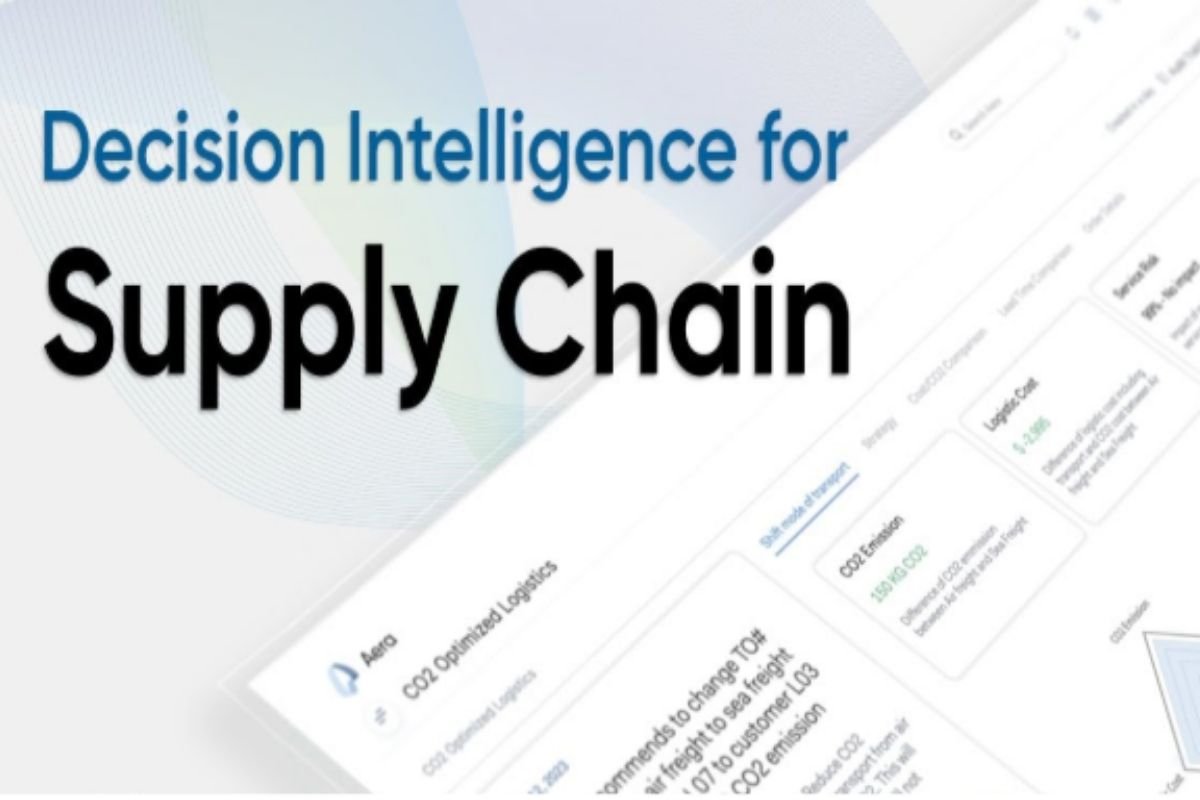Supply chains around the world are moving more quickly and breaking up more readily than before. Weather shocks, tariff changes, cyberattacks and unforeseen spikes in demand can all quickly derail well laid plans. Traditional “sense and respond” tactics that rely on BI dashboards or weekly S&OP meetings simply cannot keep up.
Decision intelligence Solutions bridge this gap. By combining real time data pipelines, advanced AI/ML models and embedded process knowledge, DI platforms turn the supply chain into a living system that constantly learns, anticipates and acts. The following section discusses the sectors in which DI is already generating triple digit returns on investment.
From “Seeing” Problems to Solving Them
Most companies now have dashboards that display the location of goods in real time. Although it’s helpful, planners still have to consider their next steps.
Through the use of dashboards, decision intelligence gathers information on costs, service targets and carbon limits to provide additional context for suggesting the best action. Rather than indicating a late shipment, DI can automatically:
- Book a different carrier
- Reroute stock from another warehouse
- Alert sales teams to adjust ship dates
In short, DI turns visibility into actionability.
The Increasing Demand for Supply Chain Intelligence
Supply chain volatility has become the norm. Supply chain disruptions lasting at least one month now occur on average every 3.7 years, as per a McKinsey study. Companies can no longer afford to use fragmented systems or out of date forecasts.
That’s where Decision Intelligence shines. It allows companies to:
- Sense disruptions as they happen
- Model the impact of decisions across the value chain
- Adjust plans dynamically based on real time data
- Reduce reliance on manual intervention and tribal knowledge
This agile, data centric approach helps organizations maintain service levels, optimize costs and build more resilient operations.
Key Ways Decision Intelligence Is Transforming Supply Chain Management
1. Real Time Demand and Supply Sensing
The demand forecast is a repeated procedure in traditional systems, and it often relies on historical trends. The data of yesterday, however, is not enough in a world where supply shocks and shifting consumer behavior are the order of things.
Through the use of real time data sources, including supplier updates, market signals, weather patterns and social sentiment, decision intelligence offers continuous sensation. Because of this, businesses are able to spot anomalies, forecast outcomes accurately and react to changes in demand or supply faster.
2. Intelligent Inventory Optimization
Inventory management is all about striking a balance between costs and stockouts to avoid revenue loss due to poor management.
With the help of the advanced algorithms, Decision Intelligence is capable of analyzing the inventory levels in the entire network and suggesting the most adequate stocks to be placed.
3. Automated Scenario Planning
In uncertain environments, “what-if” scenarios are crucial for evaluating risk and preparing for the unexpected. Decision Intelligence platforms allow supply chain teams to model the impact of various disruptions such as a factory shutdown or port delay before they occur.
These simulations help leaders evaluate trade-offs and make informed decisions quickly, backed by data rather than guesswork.
4. Supplier Risk Monitoring and Mitigation
Predicting demand in conventional systems is a time based process that relies on historical patterns. With changing consumer behavior and supply shocks, past data is insufficient.
Decision Intelligence provides continuous sensing by utilizing market signals, weather patterns, social sentiment and supplier updates as its real time sources. The use of big data can help firms to make clear guesses, see when things are not right and be quick to act when the needs or supply change.
5. End-to-End Visibility and Decision Automation
One of the strongest challenges in efficient supply chain management is the siloed data and fragmented systems. Decision Intelligence breaks down these silos by integrating data across systems like ERP, CRM, logistics, procurement and turning it into actionable insights.
Leading platforms take it a step further by enabling cognitive automation, executing routine decisions autonomously and freeing up human resources for strategic work. This “self-driving” capability is redefining supply chain efficiency.
The Business Impact of Smarter Decisions
The shift to intelligent, adaptive supply chains is already yielding measurable results:
- Faster decision cycles: People can make a decision in minutes not days.
- Lessened operational expenses: Companies can cut back on how they move things, cut down on extra stock and cut back on the risks with the people they buy from.
- Higher customer satisfaction: With better forecasting and fulfillment, service levels improve.
Greater resilience: Businesses can respond more effectively to external shocks.
Businesses that use decision intelligence are creating supply chains that can prosper in the face of uncertainty in addition to increasing performance.
Embracing the Future with Decision Intelligence
The implementation of Decision Intelligence is currently having a significant impact on the supply chain management of global enterprises. It combines the best of AI, automation and domain knowledge to help make more efficient, smarter decisions that are more in line with business objectives.
Advanced platforms provide an effective method to operationalize Decision Intelligence throughout the business of companies that are prepared to adopt this future. The ability to continuously sense, analyze and act in supply chain teams can turn complexity into a competitive advantage.
Final Thoughts
The future of supply chain management isn’t just about visibility—it’s about making the Today’s supply chains don’t just need visibility—they need intelligence. As global markets shift and disruptions become routine, the winners will be those who can sense change, analyze the impact, and act decisively.
Decision intelligence is now the cornerstone of a supply chain that is prepared for the future, not just a nice-to-have. Businesses can increase agility, manage uncertainty, and produce quantifiable effects throughout the value chain by transforming real-time data into intelligent, contextual actions.
Ready to move from reactive planning to proactive execution?
Discover how Aera Technology can help you activate Decision Intelligence across your supply chain—and make every decision your best one yet.















